Connected Life 2017‘s theme was digital inequalities. The causes and consequences of inequality are a staple of social science research, investigations into digital divides and the online cleavages of gender, race and class form the basis of many inquiries. As the information society has evolved, so have new inequalities; possessing the potential to shape life chances. The theme of the conference was to examine the construction, reproduction, and reinforcement of difference in connected life.
The connected life theme epitomizes not only a core thread among internet studies research but also the importance of knowledge exchange within and beyond academia. Connected Life 2017 provided a forum for researchers to present and discuss some of this theme’s biggest issues facing the multidisciplinary field.
2017 Keynote Speakers
 Professor Tim Jordan Professor Tim Jordan
Tim Jordan is a Professor of Digital Cultures and Head of School of Media, Film and Music at the University of Sussex. His research broadly examines the cultures and politics of digital and internet socio-technologies. He is currently researching the digital economy. He has published Information Politics: liberation and exploitation in digital society (Pluto 2015) which proposes a theory of the politics of information by examining information dynamics in the abstract, platforms as plans for information power and specific materially messy case studies. In this book he examines clouds, social media, theory of information, the securitisation of the internet and case studies of the iPad, death in online gaming and hacktivism. His prior book about communication and the internet, Internet, Society, Culture; communicative practices before and after the internet (Bloomsbury 2013) and he has previously published: Hacking: digital media and technological determinism (Polity 2008), Cyberpower (Routledge 1999) and, with Paul Taylor, Hacktivism and Cyberwars (Routledge 2004). Tim has also worked with others on the idea of ‘being in the zone’ in music, sport and cultural work through an AHRC funded research network. This research project resulted in the collected edition Culture, Identity and Intense Performativity: Being In The Zone, co-edited with B.McClure and K.Woodward (Routledge 2017). Tim has also played a role in analysing social movements and popular protest and was a founding editor of the journal Social Movement Studies. In addition to his books on social movements and internet cultures, Tim has published on Pokemon, surfing and technology and cultural theory. Prior to the University of Sussex Tim worked at King’s College London, the Open University and the University of East London. Tim has been Head of the Department of Culture, Media and Creative Industries at King’s College London and of the Department of Sociology at the Open University. |
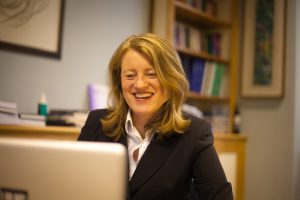 Professor Helen Margetts Professor Helen Margetts
Helen Margetts is the Director of the Oxford Internet Institute, and Professor of Society and the Internet. She is a political scientist specialising in digital era governance and politics, investigating political behaviour and political institutions in the age of the internet, social media and big data. Helen Margetts is editor-in-chief of the journal Policy and Internet, and a fellow of the Academy of Social Sciences and a Faculty Fellow of the Alan Turing Institute for Data Science. She is the author of Political Turbulence: How Social Media Shape Collective Action (with Peter John, Scott Hale and Taha Yasseri, 2016). |
2017 Participants
 Amy Orben Amy Orben
I investigate the effect of social media on human interaction and relationship formation. While previously direct and reciprocal contact was a major part of people’s social lives, many social media users now spend considerable amounts of time passively consuming: they examine others’ social media updates without engaging in any direct interaction. This unilateral form of contact challenges previous conceptions of human socialising and relationship formation. Can relationships and friendships develop or be maintained when people passively consume what other people have self-disclosed online?
In a yet sparsely researched area, I use data-driven and experimental methodologies to investigate the outcomes of passive consumption over social media. In collaboration with the Oxford Centre for the Study of Intergroup Conflict, I also examine how social media can be utilised to decrease intergroup conflict. As a Leading for Impact Fellow at the Skoll Centre for Social Entrepreneurship, I am also an active member of the Oxford Saïd Business School.
Before coming to Oxford, I completed my undergraduate degree at Cambridge reading Natural Sciences where I received the Magdalene College Scholarship, Bundy Scholarship and Browning Summer Research Grant. At Cambridge, I spent my first year studying mathematics, biology and physics but specialised in psychology by the end of my undergraduate degree. |
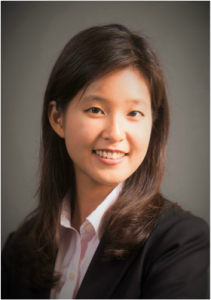 Yoonha Kim Yoonha Kim
Yoonha Kim will start her job as a visiting Assistant Professor at Georgetown University, McDonough School of Business, this Fall. Her research interest lies in the intersection of labor and personnel economics. Particularly, she investigate how an array of frictions in the labor market prevent firms from attracting and motivating the most productive employees. Since these evaluations must consider the decision of individuals to either start new businesses or work as salaried employees, another part of my research evaluates formation of small businesses. Prior to Georgetown, she earned PhD from UC Berkeley Haas School of Business, and had worked as an Analyst at Morgan Stanley in New York and graduated Phi Beta Kappa and Magna Cum Laude from Brown University with a B.Sc. in Applied Math-Economics. |
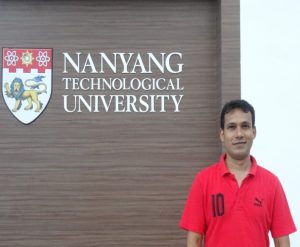 Ariful Haque Ariful Haque
Ariful Haque is a 4th year PhD Candidate in the Public Policy & Global Affairs Division at Nanyang Technological University (NTU), Singapore under NTU Research Scholarship. His current research aims to look at selected issues related to public management capacity building in Bangladesh such as corruption, open government information and innovations in government. Having joined in Bangladesh Civil Service (Administration) in 2001, he worked in different levels of the Government of Bangladesh. As a pracademic, he utilizes experiences to understand theories to diagnose problems and to seek for policy solutions. His paper in the conference titled “Public Service Innovation to Reduce Digital Divides? Unfolding the Story of Bangladesh” explains how small scale public service innovations are reducing digital divides in Bangladesh. He holds a BA and MA in English Literature from Bangladesh and a Master of Economics degree from Japan under Japan Development Scholarship. You can tweet him @arifntusg. |
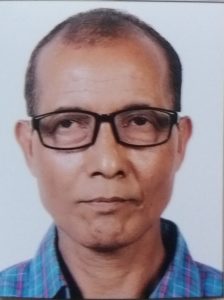 Deepak Kumar Baruah Deepak Kumar Baruah
Deepak Kumar Baruah is pursuing PhD in Public Administration at the Indira Gandhi National Open University (IGNOU), in New Delhi, India.
His research focuses on mainly on the “Digital India” projects in the state of Assam, India. He has found that digital inclusion programs for citizens, in addition to infrastructure development, are needed to address digital divide. |
 Elena Epstein Elena Epstein
Elena Esptein is a postgraduate student in the MSc in Interactive Digital Media at Trinity College in Dublin. She worked as a Digital Executive at L’Oreal Group and led digital projects involving augmented reality. Her special focus was in mobile technologies.
Elena’s research is based on problems of digital inequality and the Fourth industrial revolution, which involves development of mobile technologies. More specifically, her research explores how mobile technologies affect people’s real life in different countries. Outside of academia, Elena participates sport competitions such as a semi-marathon in Nice and the Bosphorus Cross Continental Swim. |
 Brian Justie Brian Justie
Brian Justie is a defector from the music industry that has chosen instead, following five years negotiating record deals and touring the world, to spend most of his waking hours in the library. Currently pursuing a Master of Arts at New York University, his research is situated at the crux of technology and aesthetics, using media theory as a generative lens through which to critically explore topics including machine learning, computer vision, urban informatics, and avant-garde art. Brian will be investigating the parallels and/or perpendiculars between Barthesian semiotics and Bayesian statistics for his culminating MA thesis prior to pursuing a PhD in 2018. |

Chong Zhang
Chong Zhang is a sociology Ph.D. candidate working in the School of Applied Social Science, Durham University. He is broadly interested in studying social inequality in this information age. Currently, he has two research themes a) the digital divide between rural migrants and urban citizens in urban China and b) digital inequality between the Chinese netizens on either side of the Great Firewall. Both of them are in a preliminary state only so comments and suggestions are more than welcome. I also welcome any invitation to let me join in any research project related to the digital divide. |
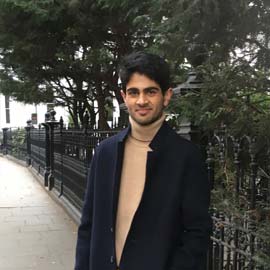 Dal Singh Dal Singh
My research seeks to advance the public interest at the intersection of digital privacy, security, and the online economy. My primary focus has been on the privacy implications of the online behavioural advertising business model, and how Internet users perceive, respond, and impact this model through different methods of intervention. My interest in privacy policy has directed me to studying and engaging with the subject through research work, government consultation, and non-profit initiatives. I am currently studying towards a Master of Information at the University of Toronto, concentrating in Critical Information Policy Studies. I have a Bachelor of Public Affairs and Policy Management from Carleton University, and have experience working in the Canadian Federal Government |

David O’Sullivan
I am a PhD in Mathematics Applications Consortium for Science and Industry (MACSI) in the University of Limerick. My research focuses on statistical and applied mathematical modelling of social processes on networks, such as information on Twitter or Customer Churn on mobile phone networks. Recently my attention has been drawn to how information diffuses between ideologically opposed groups on Twitter, in the cases of public deliberative processes, such as referendums or elections. The ultimate goals of my research are to develop robust statistical tools that will aid in the accurate identification of ideologically similar groups and to use these tools to improve our understanding of opinion dynamics on networks. |
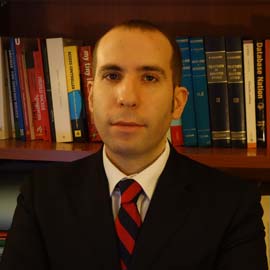 Gianluigi Fioriglio Gianluigi Fioriglio
Gianluigi Fioriglio teaches Cyberlaw at the University of Rome “Sapienza” (Department of Political Sciences) and is a teaching assistant at the University of Bologna (Chair of Legal informatics). A former Max Weber Fellow (EUI), he works in the fields of Legal Informatics and Legal Philosophy, and authored almost fifty publications, including four books. His research is currently focused on e-democracy (his latest book – in press – investigates its foundations and proposes three models of e-democracy). Moreover, his research takes into account the legal issues of expert systems, software agents and artificial intelligence (with particular regard to their application by search engine service providers). Furthermore, he proposes a general theoretical framework that shows the existence of the right to be correctly and neutrally listed, arguing that the law already recognizes a duty of transparency. |
 Harel Chait Harel Chait
Harel Chait, B.A. Communications & Media with Digital Media track [with Merit], 2008, Ariel University (Israel); M.A. (with thesis) in Political-Communication [with Distinction], 2016, Bar-Ilan University (Israel), is an expert in web accessibility for people with disabilities, the topic of his M.A. thesis: Evaluating Web Accessibility for People with Disabilities: A Comparative Study of Israeli & New Zealand Websites.
He has worked as a web accessibility consultant for PR companies, Government offices, Universities, Health services and etc. He also served as a member of the Israeli standard drafting team (WCAG) at Standard Intitule of Israel. |
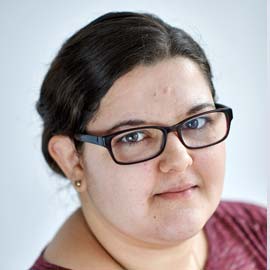 Henriette Arndt Henriette Arndt
Henriette Arndt is a doctoral student in Education with a specialisation in Applied Linguistics and Second Language Acquisition.
Her research is funded by the Economic and Social Research Council and the Foundation of German Business.
Henriette has returned to Oxford for her doctoral studies after working as an International Marketing Assistant for Amsterdam University Press. She previously completed her MSc in Applied Linguistics and Second Language Acquisition at the University of Oxford, for which she was awarded a distinction, and her Honours BA in Liberal Arts and Sciences at Amsterdam University College, in which she focused on linguistics, psychology, and media studies. |
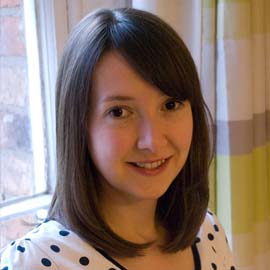 Helen Atherton Helen Atherton
Helen is an Assistant Professor in primary care at the University of Warwick. As a health services researcher she specialises in applying research methodology to address the key issues facing primary care and general practice settings. Helen’s research interests are in digital health care and her particular expertise is in use of alternatives to the face to face consultation, such as email and video. She leads and/or collaborates across studies with a focus on how communications technologies and the internet impacts on patients and healthcare professionals. She has experience in systematic review, realist review, qualitative methodology including ethnography and evaluation of complex interventions. |
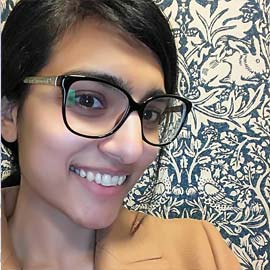 Herminder Kaur Herminder Kaur
I obtained a BSc in Sociology from Loughborough University, followed by a Masters degree in Social Research from University of Warwick. I returned to Loughborough University for my doctoral study, which was funded by the Loughborough University’s Graduate School studentship. I passed my viva in 2017 with a thesis titled Journeys and Politics in and Around Digital Media: An Ethnography Study of How Teenagers with Physical Disabilities Use the Internet. My research focuses on how teenagers with physical disabilities use the Internet. I develop and use ethnographic and visual methods. There are four key themes in my research: rhythms and movements of internet use, online relationships and visual culture, the mediation of internet use and the enactment of disability.
I have worked as a research assistant at Loughborough University and have been appointed as a representative for the ECREA Young Scholars Network Group Children, Youth and Media. |
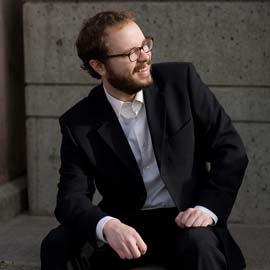 James Williams James Williams
James Williams is a doctoral candidate at the Oxford Internet Institute. His research addresses the philosophy and ethics of attention and persuasion as they relate to technology design.
He is also a co-founder of the ‘Time Well Spent’ campaign (http://timewellspent.io), a project that aims to steer technology design toward having greater respect for users’ attention, goals, and values.
Previously, James worked for over ten years at Google, where he received the Founder’s Award, the company’s highest honor. He is also a frequent speaker, consultant for companies and governments, and commentator on technology issues in the media.
James is also a visiting researcher at the Oxford Uehiro Centre for Practical Ethics, the founder of the OII’s PhilTech seminar series, and Teaching Assistant for the OII’s Internet Technology and Regulation course.
His other interests include virtual/mixed reality systems, gaming, space travel, and the work of James Joyce. His first computer was a TI-99/4A.
James holds a M.S. in Human-Centered Design and Engineering from the University of Washington and a B.A. in English Literature from Seattle Pacific University. |
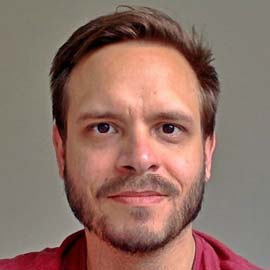 João Carlos Magalhães João Carlos Magalhães
João Carlos Magalhães is a PhD Candidate in the Department of Media and Communications at the London School of Economics and Political Science. His is interested in the political implications of the algorithmic systems which structure social media platforms. More specifically, he looks into how the regimes of visibility made possible by these systems, when negotiated by users, are associated with the construction of civic identities. His empirical entry point into these questions is the current Brazilian political crisis, and how it has transformed the possibilities of citizenship in that country, triggering a massive and polarised wave of politicisation, on and through digital platforms. |
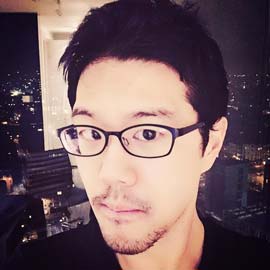 Jun Yu Jun Yu
Jun Yu is a PhD Candidate in the Department of Media and Communications at the London School of Economics and Political Science. His research project explores, within the transition to an environment increasingly mediated and governed by algorithms, the potential contradiction between social solidarity and the condition of communication under which we live. His general research interests include social and democratic theories, media ethics and justice, privacy and dataveillance, digital education governance, visibility, and algorithmic configuration of the self. |
 John Powell John Powell
Professor John Powell is an academic public health physician and health services researcher based at the Nuffield Department of Primary Care Health Sciences, University of Oxford. He has been working in the area of digital health for 20 years. His research track record is in three main areas using a wide range of methods: (1) evaluating the effectiveness of digital health tools; (2) investigating how a connected health world is changing how patients and the public interact with services and manage their own health; (3) investigating how the health service makes decisions. He is the co-Editor-in-Chief of the SAGE journal DIGITAL HEALTH. He is a Consultant Clinical Adviser at the National Institute for Health and Care Excellence, an Honorary Professor at the University of Manchester and a Visiting Professor at Kings College London. |
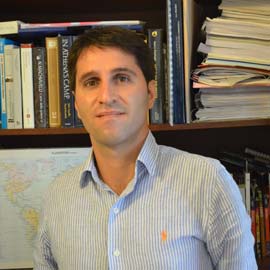 Luigi Martino Luigi Martino
Luigi Martino, Director of the Center for Cyber Security and International Relations Studies at the Department of Political Science (University of Florence); He is teaching Cyber Security and International Relations at the Department of Political Science (University of Florence) and he is project manager of the joint-project OSCE-University of Florence “Enhancing the Implementation of OSCE CBMs to Reduce the Risks of Conflict Stemming from the Use of ICTs”.
Currently, Luigi is Ph.D. Candidate in Human Rights and Global Politics, School of Advanced Studies Sant’Anna, Pisa with a Research Project on “Improving Cybersecurity for Critical Infrastructure: The Public-Private Partnership Model Against Cyber Attacks”.
He is Consultant of Italian MoFA for “cyber issues” and he is Member of the Delegation of the Italian Ministry of Foreign Affairs at the G7 Ise-Shima Cyber Group.
He holds the MA in IR with a focus on the Strategic Relevance of Cyberspace and the Risks of Cyber Warfare. |

Michelle van Velthoven
Michelle is a postdoctoral researcher in digital health at the Nuffield Department of Primary Care Health Sciences at the University of Oxford. Her research interests are in digital health, health technology assessment (HTA), and global health. She is working on projects that explore online patient ratings and experiences to improve health services, and assessment and appraisal of health apps. She is an associate editor for the SAGE journal DIGITAL HEALTH and research fellow at IMD (International Institute for Management Development). Also she is an honorary research fellow at the Imperial College London Global eHealth Unit, where she obtained her PhD in mobile health. |
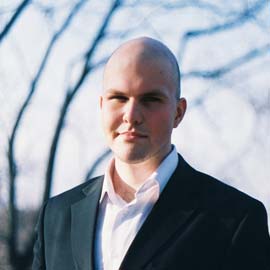 Mykyta Petik Mykyta Petik
I hail from Kyiv, Ukraine. I hold a bachelor’s degree in law from Taras Shevchenko Kyiv National University (law school). Before applying to law school and graduating, I worked as a freelance coder and web designer. Currently I am partaking an LLM in European Union Law programme at Ghent University Law School (Belgium) 2016-17 batch, where I follow the course on ICT Law, among other subjects. I have participated in a number of student conferences in Ukraine, Russia and Belgium, where I have presented papers written by me on topics under IT law, health Law and commercial law. My current interests involve legal aspects of the Internet of Things, human ICT implants and interaction between IT and biotechnologies.
Beside the above, I also interned in Arzinger Law Firm and Tax&Legal Department at KPMG in Ukraine. |
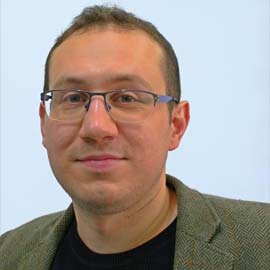
Omar Daoudi
Omar Daoudi is a PhD researcher at Centre for Cultural Policy Research (CCPR) at University of Glasgow. His thesis focuses on exploring the economic, political and cultural context of YouTube based programming in Saudi Arabia. It focuses on the bottom-up, professionally generated content (PGC) produced by the Saudi youth exclusively for YouTube – between 2010 and 2016. He presented his academic works in several universities including University of Oslo, University of Westminster and University of Glasgow. He is interested in media policy, internet studies and global media studies. Omar earned his Masters’ degree in Media Management from CCPR at University of Glasgow in 2013 and he worked as a freelancer filmmaker for two years and he was an assistant producer for some Arab televisions prior to his academic path |

Petar Terziev
Petar, is a postgraduate student in the MSc Political Sociology programme at the London School of Economics and Political Science. Based on Political and Economic Sociology, and Science and Technology Studies his research is centered on the illegal and informal economies in the Post- Communist states. More specifically, at the role of social inequality, systemic trust and social networks in the formation and reproduction of informal economic relations. He has conducted research on the illegal market for votes in Bulgarian elections, and on the role of Digital Piracy in the formation of cultural capital among piracy users. Outside of academia, Petar has appreciation of Suprematist and Constructivist art, and Balkan ethnic music. |
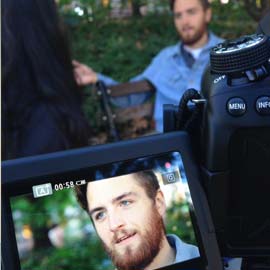
Sam Kellogg
Sam Kellogg splits his time between NYU’s Media, Culture, and Communications department, working towards his Master’s degree, and the North American Congress on Latin America (NACLA), where he is an outreach manager, event planner, and editor. His research interests include new media and communications infrastructures, Latin American history and politics, and critical theories of technology, materiality, and culture. His current work in Cuba concerns rural and off-grid networking practices, the history of infrastructural development in the Caribbean, and emergent mediated flows of data, capital, and power across the Cuban islands. Previous work has touched on cyberactivism, social media use, surveillance, and the tactical use of media by social movements. When he isn’t preoccupied with politics and technology, you might find him trekking the mountains of the Americas, trying to find places where signals don’t reach. You can tweet him @sampkellogg |
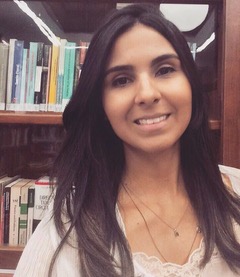
Catarina Woyames
Catarina Araújo Silveira Woyames Pinto is a PhD candidate at the Coimbra Faculty of Law, focusing on Privacy and IoT. Her research interests include Digital Inequalities in Latin America, Human Rights, and Big Data. She was born in Minas Gerais, Brazil, and holds a Law Degree and Master in International Public Law and European Law. She is a member of Internet Organization Youth and was a Fellow at the School of South Governance and the United Nations Summer Course in Slovenia. She was also a Visiting Scholar at Paris Pantheón-Assas, Hamburg University, Salamanca University and Max Planck Institute for Comparative Public Law and International Law. |
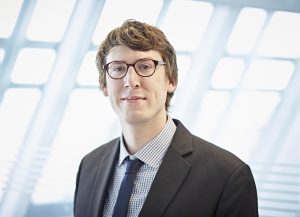
Christoph Lutz
Christoph Lutz (Dr. oec. University of St. Gallen) is Assistant Professor at the Nordic Centre for Internet and Society and at the Department of Communication and Culture, BI Norwegian Business School in Oslo. In addition, he is a Research Associate at the Institute of Communication and Media Studies, University of Leipzig. His research interests cover various aspects of social media, in particular participation, privacy and digital inequalities. Christoph is also interested in digital labor, the sharing economy, and social robots. He has published widely in leading communication, Internet and information systems journals such as New Media & Society, Information Communication & Society, Journal of the Association for Information Science and Technology (JASIST), First Monday, Journal of Management Information Systems (JMIS), Social Media + Society, and Mobile Media & Communication. |
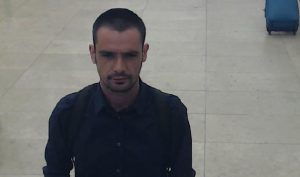
Diogo Pereira Henriques
Currently, I am a full-time funded PhD student, and previously also a research assistant at the Faculty of Engineering & Environment, Northumbria University, Newcastle upon Tyne UK. Previously, I studied and worked in the fields of urbanism, architecture, design, software, and higher education in Europe (Lisbon PT, Barcelona ES, Rome IT, and Eindhoven NL), within international environments and through multiple languages (Portuguese, English, French, Italian, Spanish, Chinese and Japanese).
I am a lifelong learner, problem solver, and interested in interdisciplinary research: future studies, urban data, spatial cognition, social media, architecture, design, information visualisation, machine learning, complex networks, creativity & innovation.
I love to travel, to experience other cultures and mindsets, and to taste local gastronomy. And I am also looking forward to global positive change. |

Marc Aurele Ferracci
Marc-Aurèle Ferracci is an MSc Candidate at the Oxford Internet Institute (OII). Originally trained in economics, digital humanities, and cultural theory at Columbia University, he has been focusing at the OII on developing sociological tools to address the challenge of inequality in the context of the digital. His current research investigates whether social and cultural forms of capital can be accumulated online, and whether these make many any contribution to students’ trajectory and access to higher education in the UK. In this context, Marc-Aurèle has been interviewing undergraduates of disadvantaged backgrounds in two British universities of contrasting intakes. |
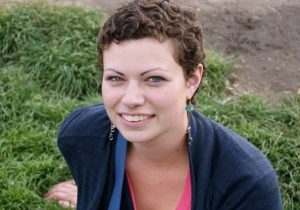
Lindsay Ferris
Lindsay is an MSc. candidate at the OII. Her dissertation centers on the experience of queer communities online and her other research interests include data ethics and feminist studies. Prior to her studies, Lindsay worked with several international and US-based civic technology organizations working to solve social problems through the use of technology and data. Lindsay holds a Bachelor of Arts in Philosophy and Russian Language from the University of Virginia. |
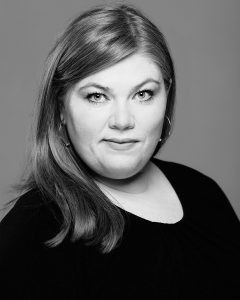
María Rún Bjarnadóttir
María Rún Bjarnadóttir is an Icelandic lawyer and is currently pursuing a PhD in Law at the University of Sussex.
Her research titled: “Does the internet limit human rights protection?” builds on her experience working for the Icelandic Government Offices in relevant fields of law; human rights, data protection and telecommunication. In her research she explores the effects jurisdiction has on enforcement of domestic legislation in the digital sphere with a particular focus on human rights obligations of states.
She has represented Icelandic authorities in the promotion and development of human rights and data protection through regional and international cooperation. She has also chaired and been a member of a number of intergovernmental committees in Iceland. |
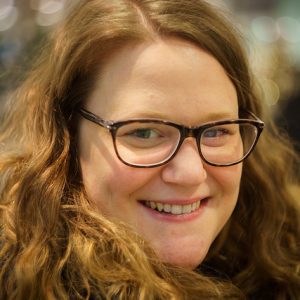
Marta E. Cecchinato
Marta E. Cecchinato is a fourth-year PhD student at the UCL Interaction Centre, working in human-computer interaction. She has a BSc and MSc in Psychology from University of Padua (Italy) and in 2015 has completed an internship at Microsoft Research Cambridge, in the Human Experience & Design group. Her current research focuses on understanding the impact that communication technologies have on people’s work-life balance, and particularly on understanding the strategies that people put into place through technology to regain control. This work has been published in top tier HCI conferences (MobileHCI2014, CHI2015, CHI2016, CHI2017). Marta has also been working in the UCL Psychology and Language Sciences (PALS) Committee for the Athena Swan submission, helping to ensure gender equality in the department. |
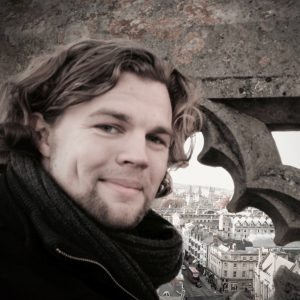
Ulrik Lyngs
Ulrik is a DPhil candidate at the Department of Computer Science, University of Oxford, supervised by Sir Nigel Shadbolt and part of the ‘Social Machines’ research group. Ulrik’s research focuses on design solutions for attention management in environments of constant digital distractions. Specifically, his project will empirically evaluate popular tools on the rapidly emerging market for anti-distraction applications, like Freedom, RescueTime and Forest.
An experimental psychologist-turned-computer scientist, Ulrik previously worked in London as an editorial producer at the HowTheLightGetsIn festival for philosophy and music before returning to Oxford. He holds an MSc in Cognitive and Evolutionary Anthropology from the University of Oxford and an MA in Psychology and the Study of Religion from the Aarhus University.
When he’s not thinking about how to save us from our smartphones, he’s playing the melodica, looking for a dancefloor to take over, or planning his next backpacking trip. |

Ruth Shillair
I am a PhD candidate in media and information studies at Michigan State University. I am interested in the human dimension of cybersecurity, how to engage, support, inform, and motivate individuals to have a cybersecurity mindset. Cybersecurity is a dynamic field that requires an interdisciplinary, collaborative approach to build a secure and trustworthy cyberspace. This year I have been working with Dr. Bill Dutton at the Quello Center as a research assistant. My past research includes online security, digital divide issues, and learning in online environments. I’ve worked on teams that look at meta-level issues (cybersecurity capacity), high security situations (online banking safety), and digital divide impacts (lower digital literacies and older adults). |
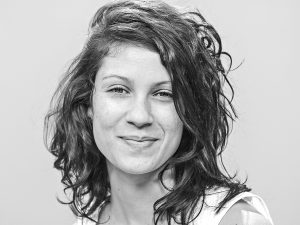
Mariana Giorgetti Valente
Director of InternetLab, an Internet policy think tank based in São Paulo, Brazil. PhD candidate in Sociology of Law at the University of São Paulo. She was a Visiting Researcher at the UC Berkeley School of Law, Boalt Hall between 2016 and 2017, a project lead and professor at the Center for Technology and Society at FGV (2012-2014), and is also a reasearcher at the Nucleus of Law and Democracy at the Brazilian for Analysis and Planning (CEBRAP). She specializes in gender and technology issues, and in copyright and access to knowledge. She directs the gender, race and other social markers research area at InternetLab, having coordinated the interdisciplinary research on non-consensual intimate images that resulted in the book “O Corpo é o Código: estratégias jurídicas de enfrentamento ao revenge porn no Brasil” (InternetLab, 2016) [The Body is the Code: legal strategies to face revenge porn in Brazil] |
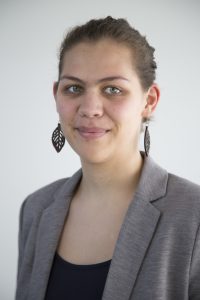
Katharin Tai
Katharin Tai is a 2nd year MPhil candidate in International Relations at the University of Oxford. She also holds a BA in Euro-Asia Relations from SciencesPo. Paris, part of which she spent studying law and politics at Tsinghua University in Beijing. Her thesis research focuses on China’s notion of “cybersovereignty” and its implications for China’s position within the existing international order, notions of spatiality and governance in Cyberspace and theories of the state. Her presentation at Connected Life will focus on coloniality as an aspect of Chinese government and elite discourse on Internet governance and how it constructs China as a developing Great Power. The presentation builds on existing International Relations research detailing how China’s semi-colonial identity is expressed in the country’s position towards the “responsibility to protect”, and explores how this identity is mobilised in Cyberspace as a new, contested dimension of international politics. |
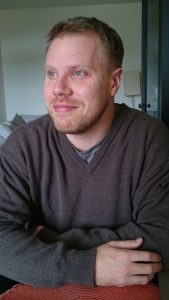
Kari Koskinen
I am a 4th year PhD student in the Information Systems and Innovation Group of the London School of Economics and Political Science. My research discusses the role of contextual factors in application development in developing countries, concentrating mainly on East Africa. The main objective in my research is to understand better how the location where applications get built, affect what gets built and how. In addition to this, I am also doing research on digital innovation and on the impact of digitalisation to product development. Prior to my studies at LSE, I studied political science in the University of Helsinki, international law in the University of Groningen and did a Masters’ programme on information society in the Open University of Catalonia. |
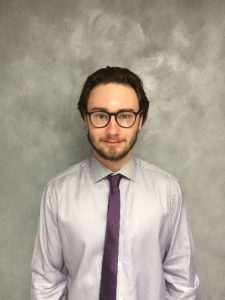
Jay Beagle
My name is Jay Beagle, I’m 21 and from Essex, I am currently a third-year Sociology student at the University of Portsmouth, upon graduating I hope to attend the University of Surrey to study for a masters degree in Social Research Methods. The piece of research I shall be presenting at the upcoming Connected Life conference is my undergraduate dissertation research, which explores the role of the internet in young people’s romantic relationships. Unlike the massive amount of research which exists into online dating, my research is concerned with exploring how young people use the internet to mediate, develop and traverse their own relationships upon transcending the dating phase. My research also considers the notion that increasing levels of relationship anxiety are manifesting themselves in young people’s relationships, as a by-product of new uncertainties which we face in our ever increasingly connected world. |
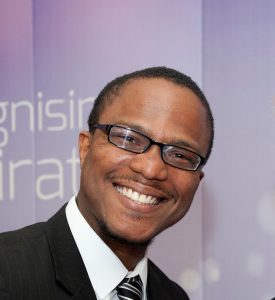
Dr Jason R. C. Nurse
Dr Jason R.C. Nurse is a Senior Researcher (Oxford Research Fellow) in Cybersecurity at Oxford University’s Department of Computer Science and a JR Fellow at Wolfson College, Oxford. His research focuses on developing novel approaches and systems for national and organisational cybersecurity. In addition to this, Jason’s research explores creative ways to identify and address the security and privacy risks that individuals face in cyberspace. This covers a range of areas, such as the risk to oversharing personal information on social media, and addressing questions about how technology, or lack thereof, impacts cybersecurity risk in society. Jason is currently involved in several projects spanning topics such as Cyber Risk and Internet-of-Things, Online Identity Risks, Cybercrime, and Security Awareness and Education. For his research into cybersecurity, Jason has been selected as a Rising Star in research as a part of the UK’s EPSRC RISE awards campaign. Find out more @jasonnurse! |
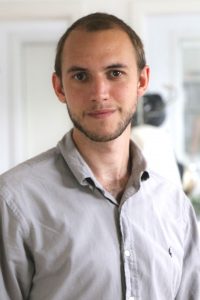
Jakob Bæk Kristensen
Jakob Bæk Kristensen is of Danish nationality and currently a Ph.D student at the University of Canterbury in New Zealand. He received his Master’s Degree in Media Studies from the University of Copenhagen in Denmark focusing on Big Data methodology in the humanities and social sciences. His current research is into public opinion formation on digital media platforms and predicting electoral vote share from social media behavior. He specializes in computational approaches to understanding the political aspects of digital media. Before starting his Ph.D he worked for the Danish consultancy firm Analyse & Tal as a political data analyst. |

Olivia Gonzalez
Olivia Gonzalez is a current Msc Student at the Oxford Internet Institute, researching cyber security law and policy at Balliol College. She graduated from New York University in 2013 and received her law degree from Fordham Law School in 2016 before passing the New York bar. In law school, she served as an intern at The White House and US Department of Justice. Her research currently focuses on legal approaches to encryption in the US and UK. Outside of her Msc research, Olivia is interested in how technological developments in Artificial Intelligence and Machine Learning will motivate changes in the law and legal practice. |
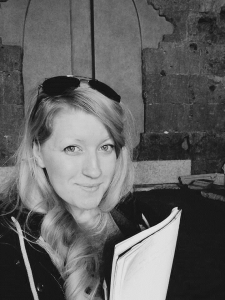
Gemma Newlands
After completing both her BA(Hons) and MPhil at Oxford University, Gemma spent some time in the London tech start-up scene during which she developed a keen interest in the digital economy and new ways of working. She has worked in Leipzig, Germany and more recently in Oslo, Norway where she is a Researcher at the Nordic Centre for Internet and Society and at the Department of Communication and Culture, BI Norwegian Business School. Currently, Gemma is primarily working on a EU Horizon 2020 Research Project on the Sharing Economy, acting as lead researcher for the sub-topic of ‘Power in the Sharing Economy’. Gemma is also working on a Youth and Media project with the Berkman Klein Center at Harvard University, focusing on youth career expectations and online labour. |
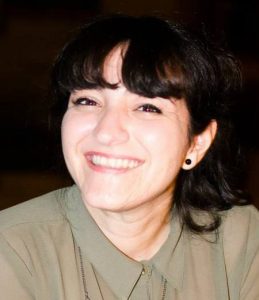
Claudia Viggiano
I am a first-year PhD student in Corpus Linguistics at the University of Portsmouth. My research looks at the emerging phenomenon of Citizen Science – online platforms where scientists and interested members of the public collaborate to carry out scientific research. I am interested in the language used on these online platforms and, in particular, in how citizen scientists build a sense of community through the use of community-specific language. |

Jonah Marrs
Jonah Marrs is a Master’s of Science in Architecture Studies Candidate with the Computation Group at the Massachusetts Institute of Technology.
Jonah’s research is inspired by artists who draw creative inspiration from their tools: John Cage’s prepared pianos, Oulipo’s constraint-based poetry experiments and Stan Brakhage’s work pushing the limits of the 16mm camera apparatus. Using novel visualization methods, Jonah seeks to reveal the hidden forms of the software tools which architects use today.
Jonah was born in Oxfordshire, U.K. and grew up in Canada. He has worked as an Intern Architect in Berlin for Sauerbruch Hutton and as an Artist in Residence at Autodesk’s Pier 9 in San Francisco. |
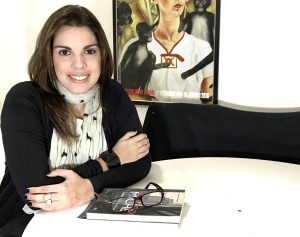
Beatriz Accioly
Master of Sciences, Social Anthropology Department at University of São Paulo, Brazil. Member of NUMAS (Social Markers of Difference Studies Group) that congregates researchers who work with intersections between gender, sexuality, race, class, generation and other possible forms of differentiation and their effects on access to legal rights and social recognition. Currently, conducting a PhD research on gender, definitions of crime and violence, activism and the internet, more specifically the public controversy involving media, law makers, activists and internet companies in cases of “revenge porn” (nonconsentual disclosure of sexual and/or intimate images and videos usually of women). Methodologically and theoretically, reflect upon the use of social media as a form of both perpetrating and fighting this social phenomenon, that is also being disputed as a new facet of violence against women and/or as an example of the need for internet regulations and sometimes as a cause for some contradictory activism. |
Yazmin Morlet Corti
 Yazmin is a data lover, online privacy advocate and PhD researcher in politics for the University of Edinburgh. An old Macintosh LC from 1993 encouraged her interest in computing. She holds a MA in Political Science from CEU in Budapest and a BA in Communication Sciences and Political Communication from UNAM in Mexico. She is currently working on comparing online user privacy behaviours between cultures from an interdisciplinary perspective through game simulation. Some of her satellite interests include: Big Data, algorithms and digital marketing strategies. Yazmin is a data lover, online privacy advocate and PhD researcher in politics for the University of Edinburgh. An old Macintosh LC from 1993 encouraged her interest in computing. She holds a MA in Political Science from CEU in Budapest and a BA in Communication Sciences and Political Communication from UNAM in Mexico. She is currently working on comparing online user privacy behaviours between cultures from an interdisciplinary perspective through game simulation. Some of her satellite interests include: Big Data, algorithms and digital marketing strategies.
|
Paula Melgaço
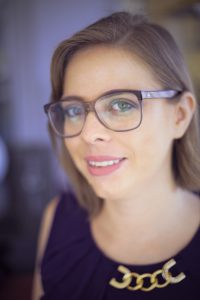 Paula Melgaço (Pontifical Catholic University of Rio de Janeiro/PUC-Rio): Ph.D. student in Clinical Psychology at PUC-Rio, where she develops her research on the creative uses of new digital technologies, including the Internet as an empowerment tool for lower classes in Brazil and the creative relationships that adolescents construct with the tools and resources available in the virtual world. Paula is a specialist in psychoanalysis with children and adolescents and professor of the specialization course “psychoanalysis: the clinic of the child and the adolescent” at the Pontifical Catholic University of Minas Gerais (PUC-Minas). She is also co-coordinator of the Adolescence and Technology Center of the Interdisciplinary Laboratory of Research and Social Intervention (LIPIS/PUC-Rio) and one of the editors of the book “How technology changes my life”: youth images’ in the digital age. (“Como a tecnologia muda o meu mundo”: imagens da juventude na era digital,2016). Paula Melgaço (Pontifical Catholic University of Rio de Janeiro/PUC-Rio): Ph.D. student in Clinical Psychology at PUC-Rio, where she develops her research on the creative uses of new digital technologies, including the Internet as an empowerment tool for lower classes in Brazil and the creative relationships that adolescents construct with the tools and resources available in the virtual world. Paula is a specialist in psychoanalysis with children and adolescents and professor of the specialization course “psychoanalysis: the clinic of the child and the adolescent” at the Pontifical Catholic University of Minas Gerais (PUC-Minas). She is also co-coordinator of the Adolescence and Technology Center of the Interdisciplinary Laboratory of Research and Social Intervention (LIPIS/PUC-Rio) and one of the editors of the book “How technology changes my life”: youth images’ in the digital age. (“Como a tecnologia muda o meu mundo”: imagens da juventude na era digital,2016).
|
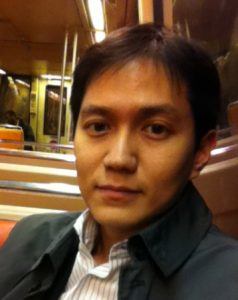 Kyung R Park Kyung R Park
Kyung R. Park is a PhD candidate in Management Department at London School of Economics and Political Science (LSE). Kyung’s research is primarily concerned with questions of digital technology, knowledge and power in international development. His empirical research explores the role of open data and information systems in aid coordination among stakeholders.
He has extensive experiences on development policy and ICT projects with the World Bank, International Vaccine Institute (IVI), UN World Intellectual Property Organization (WIPO), Korea International Cooperation Agency (KOICA) and Innovation for Poverty Action (IPA). He worked in Tanzania, Kenya, Uganda, India, Indonesia, Cambodia and the United States.
He holds a Master’s degree in Public Policy from Harvard University, B.S. in Chemical and Biological Engineering, and B.A. in International Relations from Seoul National University (SNU) in Korea. |
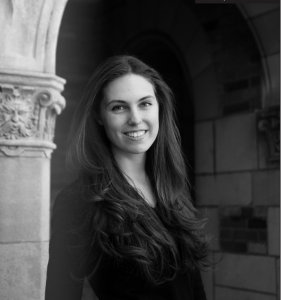
Aiste Zalepuga
Aiste Zalepuga is a MSc student at the Oxford Internet Institute at Oxford University. She is interested in digital government, law and technology. She received her BA from Yale University. |
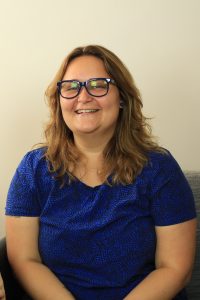
Carolina Parreiras Silva
I am postdoctoral fellow in Anthropology at São Paulo University (USP – Brazil). My current research has as its theme the narratives around sexual violence and gender violence against children and teenagers in two favelas located in Rio de Janeiro (Brazil). An important part of my work was always about technology and its uses (specially the intersection between tehcnology and gender and sexuality issues). That is why I was one the participants of Oxford Internet Institute’s Summer Doctoral Programme in 2012. Now I’m interested in understand how technology became a tool that serves to sexual exploitation and sexual violence against children and teenagers in contexts characterized as excluded from the technological development. |
Programme
|
|
| Welcome Speech
10:00 – 10:45 |
|
|
|
|
|
|
|
|
|
|
|
|
|
|
|
|
|
|
|
|
|
|
O’Reilly Award Announcement [10 mins]
|
Keynote: Professor Tim Jordan
|
Panels
Panel 1: Urban and Global
Jonah Ross-Marrs
Modelling The City: The Unexpected Role Of Building Information Modeling In Shaping Our Built Environment
Paula Melgaco
The Internet As A Possibility Of Empowerment For The Urban Popular Classes In Brazil
Kari Koskinen
Digital Divide And Application Development In Developing Countries: A Routine-Based Approach
|
Panel 2: Education and Communal Learning
Henriette L. Arndt
The Role Of Online Media In 21st Century Language Learning
Marc Aurele Ferracci
Not For The Likes Of Us? Higher Education, Inequality, And The Power Of The Digital
Claudia Viggiano
Community-Specific Language In Online Citizen Science Forums: A Corpus-Driven Diachronic Study
|
Panel 3: Divided Visibility
Gemma Newlands
Some #Influencers Are More Equal Than Others: Normalising Distinction On Instagram
James Williams
Clicks Against Humanity: The Nature And Ethics Of Digital Advertising
Petar Terziev
Digital Piracy And Cultural Capital |
Panel 4: Disability and Health
Herminder Kaur
Unravelling The Rhythms Of Moving In And Out Of The Internet: A Study Based On Video Diaries Of Teenagers With Physical Disabilities
Harel Chait
Evaluating Web Accessibility For People With Disabilities To Israeli & New-Zealand Websites: A Comparative Study
John Powell
Improving NHS Quality Using Internet Ratings And Experiences (INQUIRE): Survey Of The General Public To Understand Use Of Online Feedback On Health Services
|
Panel 5: Gender and Sex Online
Beatriz Accioly Lins
“Revenge Porn” In Brazil: Reflections On Gender, Sexuality And Field Work On And About The Internet
Carolina Parreiras Silva
Online Sexual Violence Against Children And Teenagers, Vulnerabilities And Inequalities: Ethnographical Notes About Two Favelas In Brazil.
Lindsay Ferris
Navigating The Affordances Of Tinder And Their Impact On LGBTQ+ Communities
Mariana Giorgetti Valente
Facing NCII In Brazil From An Intersectionality Standpoint
|
Panel 6: Politics and E-Government
Kyung R Park
Digital Inequality – A New Source Of Generational Conflict? Case Of Balkanization In South Korea
Aiste Zalepuga
Government Gone Digital: Lessons From Divergent Results In Estonia And Lithuania
Catarina Araújo Silveira, Woyames Pinto
Towards E-Democracy Among Indigenous People In Latin America
Sam P. Kellogg
Fiber-Optic Diplomacy: Cuba And The Global Geopolitics Of Data
|
Panel 7: Political Socializing
Diogo Pereira Henriques
Data Sharing, Internet Servers, And Climate Change: ‘What’s Yours Is Mine, And What’s Mine Is…
David JP O’Sullivan
Integrating Sentiment And Social Structure To Determine Preference Alignments: The Irish Marriage Referendum
Jakob Bæk Kristensen
Measuring Political Discussion – A Big Data Method Linking Facebook News Commentary With The Political Like History Of Users
Omar Daoudi
The Saudi Government Reactions To Youtube Based Programming: The Content Makers’ Perspective
|
Panel 8: Algorithmic Inequality
Gianluigi Fioriglio
Digital Inequality By Algorithm: The (Real) Case Of Search Engines
Joao Carlos Magalhaes
Algorithmic Visibility – Unequal Entanglements Between Gatekeeping And Surveillance On Social Media Platforms
Jason Nurse
Mind The Gap: How Digital Inequality Impacts Cybersecurity
Brian M Justie
Algorithms, Assemblages, And Quantified Queerness
|
Poster Presentations
| Jay Beagle |
The Digital Age and the Impact of the Internet on the Transformation of Young People’s Experience of Romantic Relationships |
| Olivia Gonzalez |
Approaching Encryption’s Legal Puzzles |
| Luigi Martino |
Bridging the Gap of Cyber Diplomacy. The Main Role of the UN GGE and OSCE in order to Enhance Transparency and Cooperation in Cyberspace |
| Ruth Shillair |
Marginalized, victimized, and unaware: Cyber security threats, age cohort and the second digital divide |
| Ulrik Lyngs |
Ulysses in Cyberspace |
| Zoetanya Sujon |
“I hate it with a passion”: Compulsive connection, Facebook and cultures of affiliation |
| Amy C. Orben |
Unequal Friendships and Facebook Stalking |
| Chong Zhang |
Knowledge gaining and political participation as a result of bypassing the Chinese great firewall? Digital inequality between the Chinese netizens on either side of the wall |
| Dalbir Singh |
Consent, tactical privacy protection, and the future of the online digital economy |
| Marta E. Cecchinato |
Always connected = Always Available? The Role of Microboundaries |
| Mykyta Petik |
IoT and Human Implants: Legal Challenges |
| Ariful Haque |
Public Service Innovation to Reduce Digital Divides? Unfolding the Story of Bangladesh |
| Katharin Tai |
A Case of Mistaken Identity? Coloniality as a Feature of Chinese Cyber Sovereignty Discourse |
| María Rún Bjarnadóttir |
The Solution To Online ‘Harassment’ Is Simple: Women Should Log Off |
| Deepak Kumar Baruah |
Implementation of “Digital India” Program in Assam, India |
|














































 Yazmin is a data lover, online privacy advocate and PhD researcher in politics for the University of Edinburgh. An old Macintosh LC from 1993 encouraged her interest in computing. She holds a MA in Political Science from CEU in Budapest and a BA in Communication Sciences and Political Communication from UNAM in Mexico. She is currently working on comparing online user privacy behaviours between cultures from an interdisciplinary perspective through game simulation. Some of her satellite interests include: Big Data, algorithms and digital marketing strategies.
Yazmin is a data lover, online privacy advocate and PhD researcher in politics for the University of Edinburgh. An old Macintosh LC from 1993 encouraged her interest in computing. She holds a MA in Political Science from CEU in Budapest and a BA in Communication Sciences and Political Communication from UNAM in Mexico. She is currently working on comparing online user privacy behaviours between cultures from an interdisciplinary perspective through game simulation. Some of her satellite interests include: Big Data, algorithms and digital marketing strategies. Paula Melgaço (Pontifical Catholic University of Rio de Janeiro/PUC-Rio): Ph.D. student in Clinical Psychology at PUC-Rio, where she develops her research on the creative uses of new digital technologies, including the Internet as an empowerment tool for lower classes in Brazil and the creative relationships that adolescents construct with the tools and resources available in the virtual world. Paula is a specialist in psychoanalysis with children and adolescents and professor of the specialization course “psychoanalysis: the clinic of the child and the adolescent” at the Pontifical Catholic University of Minas Gerais (PUC-Minas). She is also co-coordinator of the Adolescence and Technology Center of the Interdisciplinary Laboratory of Research and Social Intervention (LIPIS/PUC-Rio) and one of the editors of the book “How technology changes my life”: youth images’ in the digital age. (“Como a tecnologia muda o meu mundo”: imagens da juventude na era digital,2016).
Paula Melgaço (Pontifical Catholic University of Rio de Janeiro/PUC-Rio): Ph.D. student in Clinical Psychology at PUC-Rio, where she develops her research on the creative uses of new digital technologies, including the Internet as an empowerment tool for lower classes in Brazil and the creative relationships that adolescents construct with the tools and resources available in the virtual world. Paula is a specialist in psychoanalysis with children and adolescents and professor of the specialization course “psychoanalysis: the clinic of the child and the adolescent” at the Pontifical Catholic University of Minas Gerais (PUC-Minas). She is also co-coordinator of the Adolescence and Technology Center of the Interdisciplinary Laboratory of Research and Social Intervention (LIPIS/PUC-Rio) and one of the editors of the book “How technology changes my life”: youth images’ in the digital age. (“Como a tecnologia muda o meu mundo”: imagens da juventude na era digital,2016).

